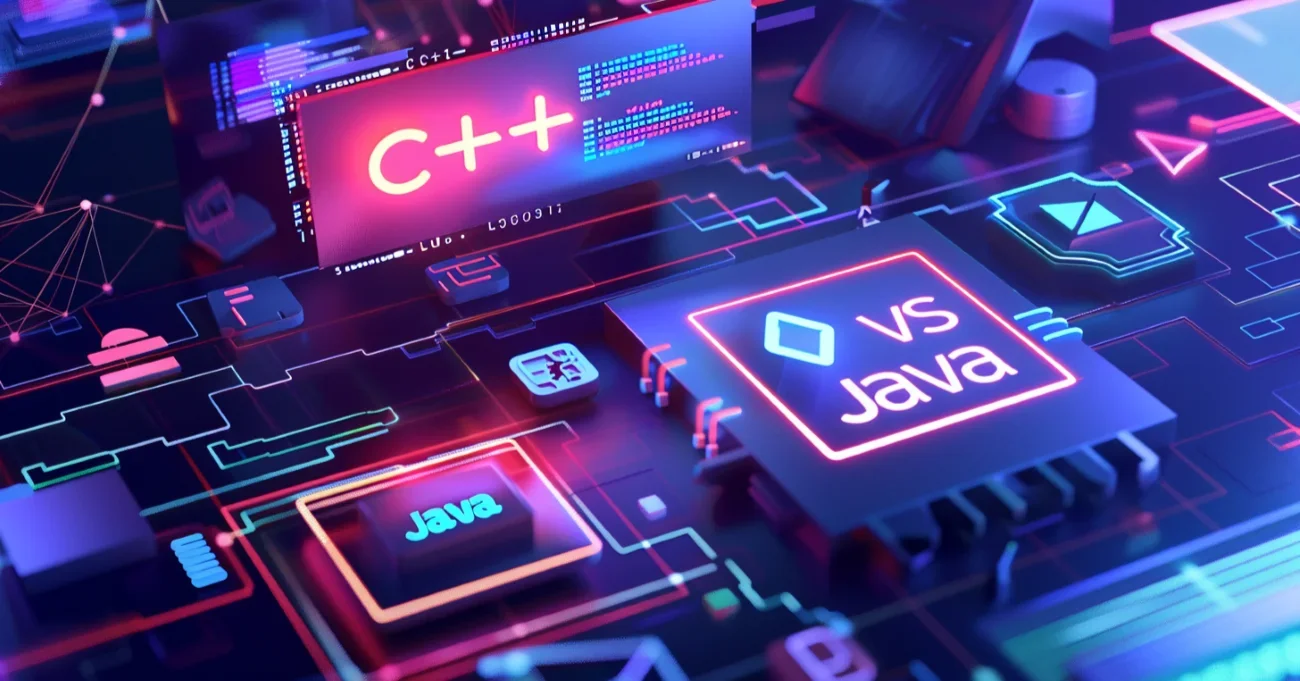A careful choice of the best programming language significantly influences the direction of your development endeavors. Among these popular languages, C++ vs Java stand out due to their specific applications. Each language has firmly established itself in various domains, offering unique strengths and different purposes.
Proficiency in both C++ and Java empowers developers to harness the specific advantages of each. This enables them to address extensive programming complexities and foster groundbreaking innovations in the technology sector.
Aloa, a software outsourcing firm renowned for excellence, boasts top-tier talents proficient in C++ vs Java. With our extensive experience and expertise in the field, we ensure high-quality coding for all projects. Whether you require a C++ developer for robust solutions or a Java programmer for versatile applications, Aloa’s talent pool surpasses industry standards to deliver unparalleled results.
Drawing from our extensive experience in software development, we've crafted this guide to help you navigate the decision between C++ vs Java. Our experience encompasses a spectrum of projects, allowing us to offer nuanced insights into their comparative advantages. In the end, you'll gain clarity on which language aligns best for your project.
Let’s dive in!
C++ vs Java: What’s the Difference?
Exploring C++ vs Java illuminates the variances between these prominent programming languages. C++, known for its performance and close-to-hardware functionality, is favored in-system programming and low-level development. In contrast, Java is a preferred choice for web-based applications and enterprise solutions due to its platform’s independence, robust ecosystem, and versatility.
In exploring the unique capabilities and applications of C++ and Java, developers comprehensively understand their strengths and limitations. This enables them to make informed decisions and drive innovation in software development.
What is C++?
To better understand C++ vs Java, C++ is a versatile and powerful programming language renowned for its efficiency, flexibility, and performance. Originating as an extension of the C programming language, C++ introduces object-oriented programming concepts that allow developers to create modular, reusable code through classes, inheritance, and polymorphism.
Its close-to-hardware functionality and support for low-level memory manipulation make it a preferred choice for system programming, game development, and performance-critical applications. Despite its complexity, C++ remains a cornerstone language in software development. It empowers developers to build high-performance applications across diverse domains.
What is Java?
Java is a programming language renowned for its simplicity, portability, and robustness. Developed by James Gosling and his team at Sun Microsystems, Java language was designed to be platform-independent and allow code to run on any device with a Java Virtual Machine (JVM).
Its object-oriented nature, automatic memory management, and extensive standard library make it well-suited for various applications, including web development frameworks, mobile app development, enterprise software, and large-scale distributed systems.
Core Differences Between C++ vs Java
As two of the most prominent programming languages in software development, C++ vs Java exhibit distinct characteristics and functionalities. While both offer robust solutions, grasping their core differences is essential for developers.
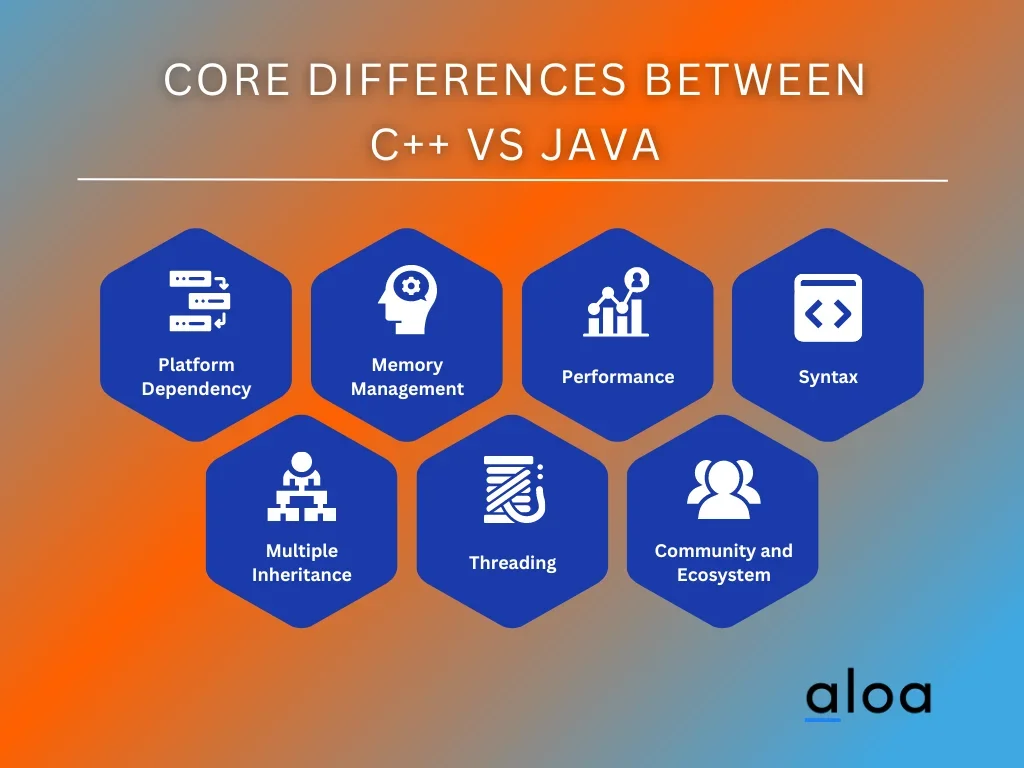
Here are the main differences between C++ and Java to streamline your code optimization:
- Platform Dependency: C++ is platform-dependent and requires compilation for each target platform. On the other hand, Java’s platform independence allows compiled code to run on any device with a Java Virtual Machine (JVM).
- Memory Management: C++ offers manual memory management through pointers to provide developers with granular control over memory allocation and deallocation. Meanwhile, Java employs automatic garbage collection, which simplifies memory management tasks and reduces the risk of memory leaks and segmentation faults.
- Performance: C++ typically outperforms Java due to its direct hardware access and minimal runtime overhead, particularly in real-time systems and gaming. In contrast, Java emphasizes readability and ease of use, which makes it a preferred choice for enterprise applications.
- Syntax: C++ syntax is more complex and flexible to support low-level memory manipulation and operator overloading. Conversely, Java’s syntax is simpler and more standardized to emphasize readability and ease of use for developers.
- Multiple Inheritance: C++ supports multiple inheritance to allow a class to inherit from multiple base classes. Alternatively, Java only supports single inheritance through classes but enables multiple inheritance through interfaces to enhance code organization and flexibility.
- Threading: C++ lacks built-in thread support and relies only on third-party concurrency libraries. On the other hand, Java includes robust thread support through its native Thread class and concurrency utilities to easily facilitate the development of multithreaded applications.
- Community and Ecosystem: The C++ community is known for its extensive libraries and frameworks catering to various domains. Conversely, Java boasts a more extensive ecosystem with many tools, libraries, and community support.
Understanding the core differences between C++ vs Java mentioned above provides developers with valuable insights into the strengths and weaknesses of each language. This enables them to choose the most suitable tool for their programming needs.
Use Case For C++
C++ vs Java are both utilized in programming, yet they differ significantly in their applications and capabilities. C++ stands out for its performance and low-level control, which makes it indispensable for system programming. Here are the use cases for C++ vs Java that highlight its unique strengths and versatility in various domains:
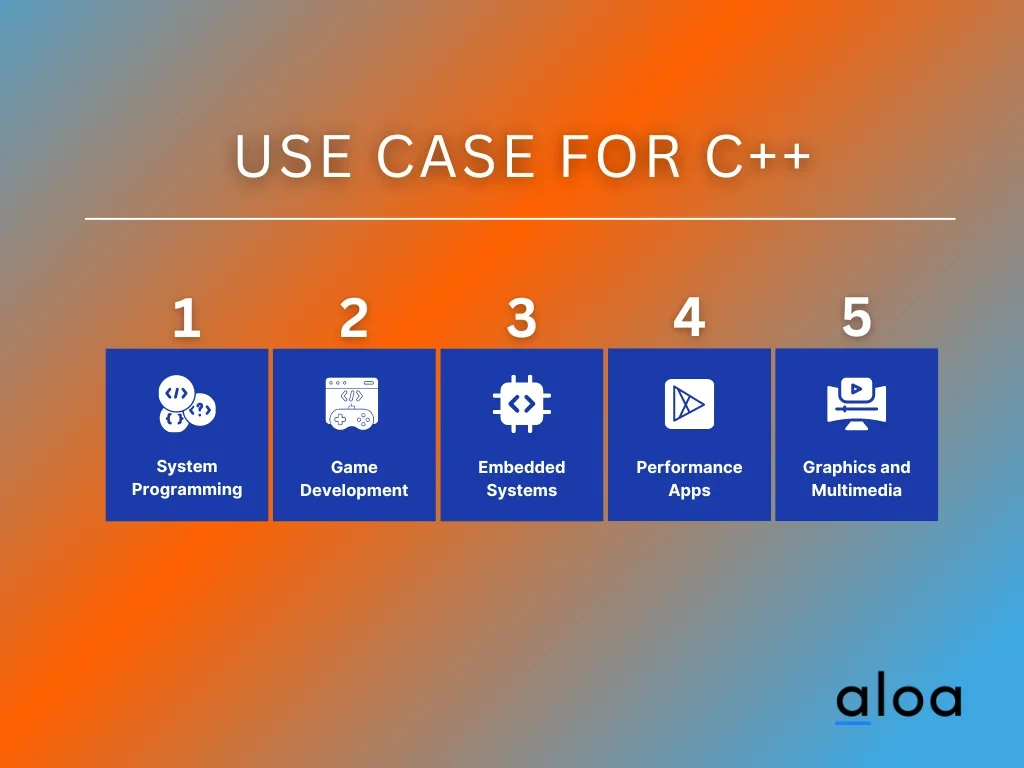
System Programming
C++ is extensively used in programming tasks such as developing operating systems, device drivers, and firmware. Its ability to interact closely with hardware and efficiently manage system resources makes it an ideal choice for low-level tasks. For example, the Linux kernel and Windows OS components are written in C++.
Game Development
C++ is the preferred language for game development due to its high performance and direct hardware access. Game engines like Unreal Engine and Unity are built using C++, which enables developers to create complex and graphics-intensive games for various platforms. Many popular AAA titles, including Fortnite and Call of Duty, are developed using C++.
Embedded Systems
C++ is widely employed in embedded systems development for applications like IoT devices, automotive electronics, and industrial control systems. Its ability to generate compact and efficient code makes it suitable for resource-constrained environments. Devices such as smartwatches, automotive infotainment systems, and industrial robots often rely on C++ for their software development.
Performance-Critical Applications
C++ is commonly used in applications that demand high performance, such as financial algorithms, scientific simulations, and real-time processing systems. Its efficient memory management and low-level control allow developers to optimize code for maximum speed and responsiveness. Applications like high-frequency trading systems and computational physics simulations benefit from C++’s performance capabilities.
Graphics and Multimedia
C++ is utilized in graphics and multimedia applications for tasks such as image processing, computer-aided design (CAD), and video editing. Its robust libraries, like OpenGL and DirectX, provide developers powerful tools to create visually rich and interactive software. Professional software like Adobe Photoshop and Autodesk Maya extensively use C++ for their core functionalities.
Use Case for Java
Aside from C++, Java has a distinct use case to help better understand the differences between C++ vs Java. Java’s platform independence and extensive ecosystem make it a preferred choice in web development, enterprise solutions, and Android app development. Below, we delve into the specific use cases for Java to highlight its versatility and broad application across various sectors.
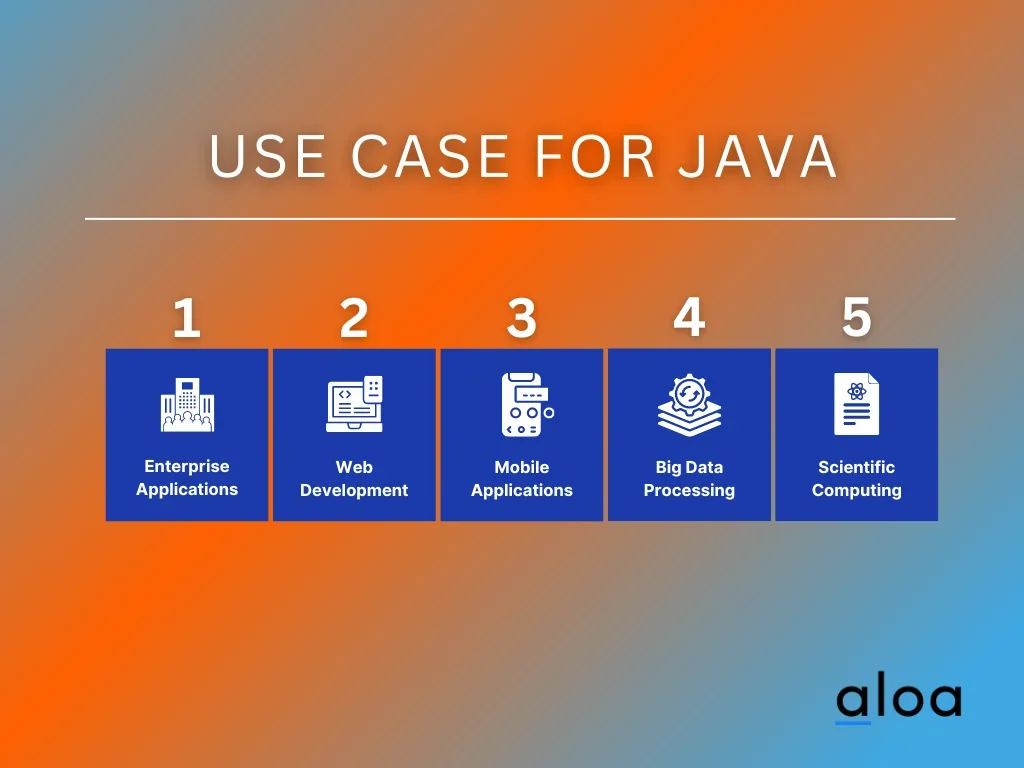
Enterprise Applications
Java is widely used for developing enterprise applications such as customer relationship management (CRM) systems, enterprise resource planning (ERP) software, and financial management systems. Its scalability, platform independence, and extensive libraries like Spring Framework make it suitable for building large-scale, mission-critical applications that can run in diverse environments.
Web Development
Java is commonly employed in web development to build dynamic and scalable web applications. Frameworks like Spring Boot and JavaServer Faces (JSF) facilitate the rapid development of web-based solutions, including e-commerce platforms, content management systems (CMS), and social networking sites. Java’s robust security features and support for server-side technologies like Servlets and JSP contribute to its popularity in web development.
Mobile Applications
Java is the primary language used to develop Android applications, making it indispensable for mobile app development. Android Studio, the official integrated development environment (IDE) for Android, leverages Java to create feature-rich, cross-device-compatible mobile apps. With a vast ecosystem of libraries and tools, Java enables developers to build engaging mobile experiences for millions of users worldwide.
Big Data Processing
Java is widely used in big data processing and analytics due to its scalability, performance, and compatibility with big data frameworks like Apache Hadoop and Apache Spark. Developers leverage Java’s multithreading capabilities and rich ecosystem to build distributed data processing applications for handling massive volumes of structured and unstructured data. Java plays a crucial role in the extensive data ecosystem, from data ingestion and transformation to analysis and visualization.
Scientific Computing
Java is utilized in scientific computing applications for numerical analysis, simulations, and modeling in various domains such as physics, engineering, and bioinformatics. Libraries like Apache Commons Math and JScience provide comprehensive mathematical functions and algorithms to empower developers to tackle complex computational tasks efficiently.
Java’s platform independence and support for parallel computing make it a preferred choice for scientific research and computational experiments.
Benefits of C++
In understanding C++ vs Java, it’s essential to recognize the unique advantages that C++ brings. C++ offers various benefits that C++ developers leverage for enhanced project performance and versatility. Here are the benefits of C++ that make it a preferred choice for specific applications and industries:
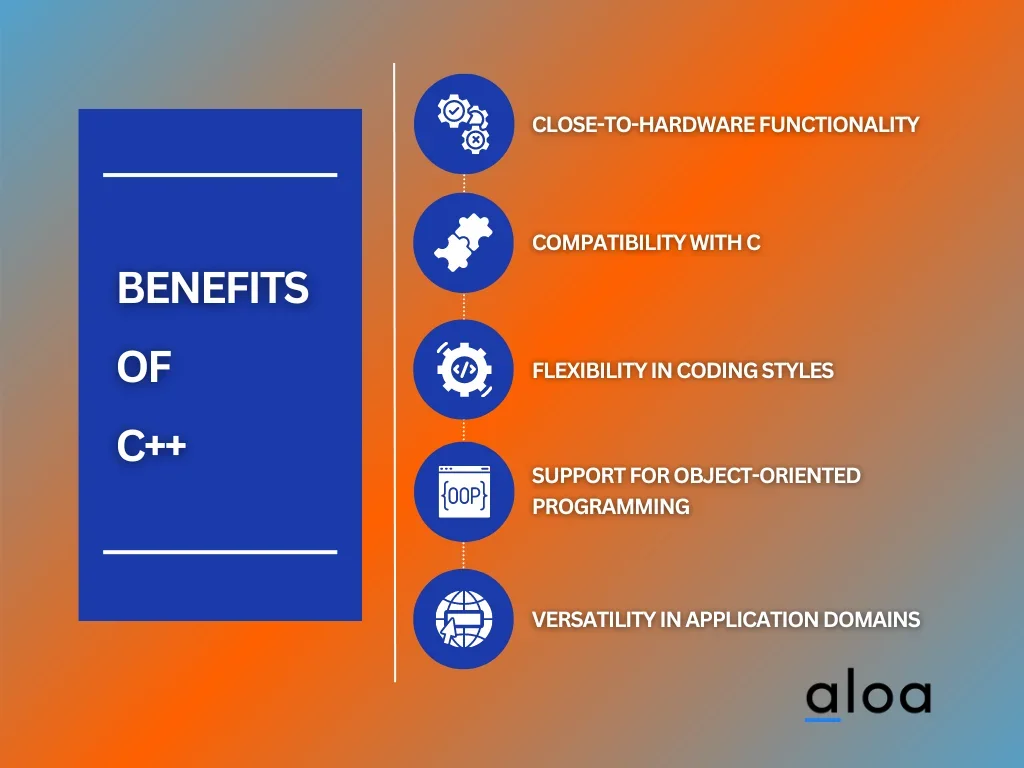
Close-to-Hardware Functionality
Close-to-hardware functionality in C++ allows developers to access system resources directly. This feature is particularly advantageous in system programming, where precise control over hardware components is essential for efficiency. Additionally, interacting closely with hardware facilitates memory management and input/output operations.
Compatibility with C
C++’s compatibility with C allows developers to seamlessly integrate existing C code into their projects, using legacy codebases and libraries without extensive rewrites. This interoperability facilitates smoother transitions for projects migrating from C language to C++, preserving previous investments in code and knowledge.
On top of that, C++’s compatibility with C fosters a broader ecosystem of tools, libraries, and frameworks. This enhances development efficiency and enables access to a wealth of resources.
Flexibility in Coding Styles
C++ allows developers to be flexible in their coding styles to accommodate various programming paradigms, such as procedural, object-oriented, and generic programming. This adaptability empowers developers to choose the most suitable approach for each project aspect that optimizes code organization and readability. Developers can leverage this flexibility to create scalable and maintainable software solutions that meet diverse requirements.
Support for Object-Oriented Programming
C++ supports object-oriented programming (OOP), providing developers with powerful features like classes, inheritance, polymorphism, and encapsulation. These features enable developers to create modular, reusable, and maintainable code to enhance productivity and code organization. OOP principles can help developers design software systems that closely model real-world entities and facilitate intuitive problem-solving and system design.
Versatility in Application Domains
C++ offers versatility in application domains due to its ability to handle diverse programming tasks, ranging from system-level programming to high-level application development. This flexibility allows developers to create software for various purposes, including operating systems, games, embedded systems, and enterprise applications. As a result, hiring a C++ developer proficient in this language equips teams to navigate diverse domains.
Benefits of Java
When comparing C++ vs Java, Java also provides numerous advantages that underscore its versatility and widespread adoption in the software industry. Below are the benefits of Java that highlight its versatility and widespread adoption in the software industry.
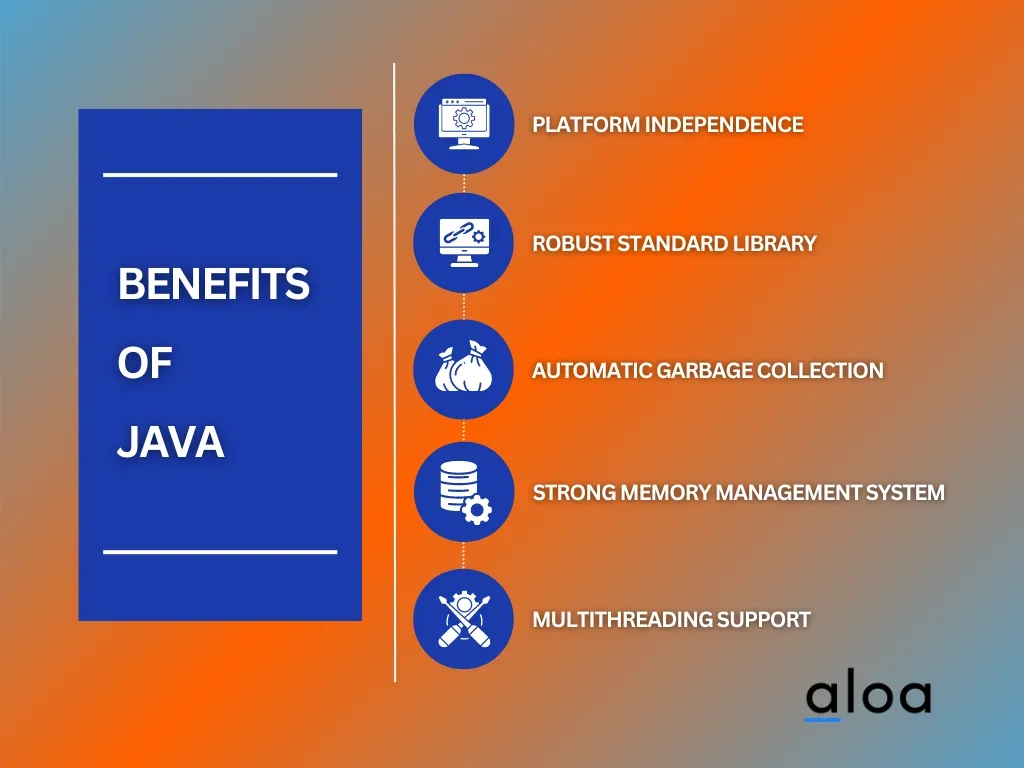
Platform Independence
Java’s platform independence refers to its capability to run on any platform without recompilation, making it highly portable and accessible across different operating systems. This feature enables developers to write code once and deploy it anywhere to simplify software distribution and reduce development time and costs.
Consequently, Java’s platform independence promotes interoperability and ensures that applications can reach a broader audience without compatibility issues.
Robust Standard Library
Java’s robust standard library encompasses many pre-built classes and functions. This extensive library simplifies development by providing ready-made solutions for everyday programming challenges. As a result, it saves developers time and effort in implementing complex functionalities from scratch. Furthermore, the availability of a rich standard library fosters Java code reuse, promotes consistency, and enhances the reliability and maintainability of Java applications.
Automatic Garbage Collection
Automatic garbage collection in Java automatically reclaims memory occupied by objects no longer in use. Such a process prevents memory leaks and reduces the risk of memory-related errors. The garbage collector feature eliminates manual memory management and allows developers to focus more on application logic than memory allocation and deallocation tasks.
Considering those aspects, hiring an expert Java developer can leverage this built-in feature to write cleaner, more reliable code with fewer bugs. Ultimately, this leads to increased productivity and faster development cycles.
Strong Memory Management System
Java programs boast a robust memory management system that efficiently handles memory allocation and deallocation tasks. This system utilizes automatic memory management techniques, such as garbage collection, to dynamically allocate and release memory.
As a result, it reduces the burden on developers for manual memory management. Similarly, Java enhances developer productivity, simplifies application development, and contributes to Java applications' overall stability and reliability.
Multithreading Support
Java offers robust multithreading support, allowing developers to create concurrent and efficient applications to perform multiple tasks simultaneously. This capability enables developers to leverage modern hardware’s full potential with multicore processors, leading to improved performance and responsiveness in Java applications.
Multithreading also facilitates better resource utilization and scalability, which makes it particularly advantageous for building high-performance, scalable, and responsive software.
Key Takeaway
The exploration of C++ vs Java reveals their unique characteristics and applications within programming. Understanding the core differences between these two languages equips developers with valuable insights for selecting the most suitable tool for their specific needs.
Whether leveraging C++’s hardware control or Java’s robust ecosystem, developers are empowered to create innovative solutions across diverse domains. With this knowledge, developers can confidently navigate the programming landscape, harnessing each language's strengths to propel their projects to success.
Looking to hire talented experts in C++ and Java? Aloa’s hiring page offers a curated selection of top-tier developers ready to meet your project needs. You can also explore our blog page for industry insights and innovation strategies. With precision and proficiency, Aloa can be your trusted partner in navigating the complexities of software development.

